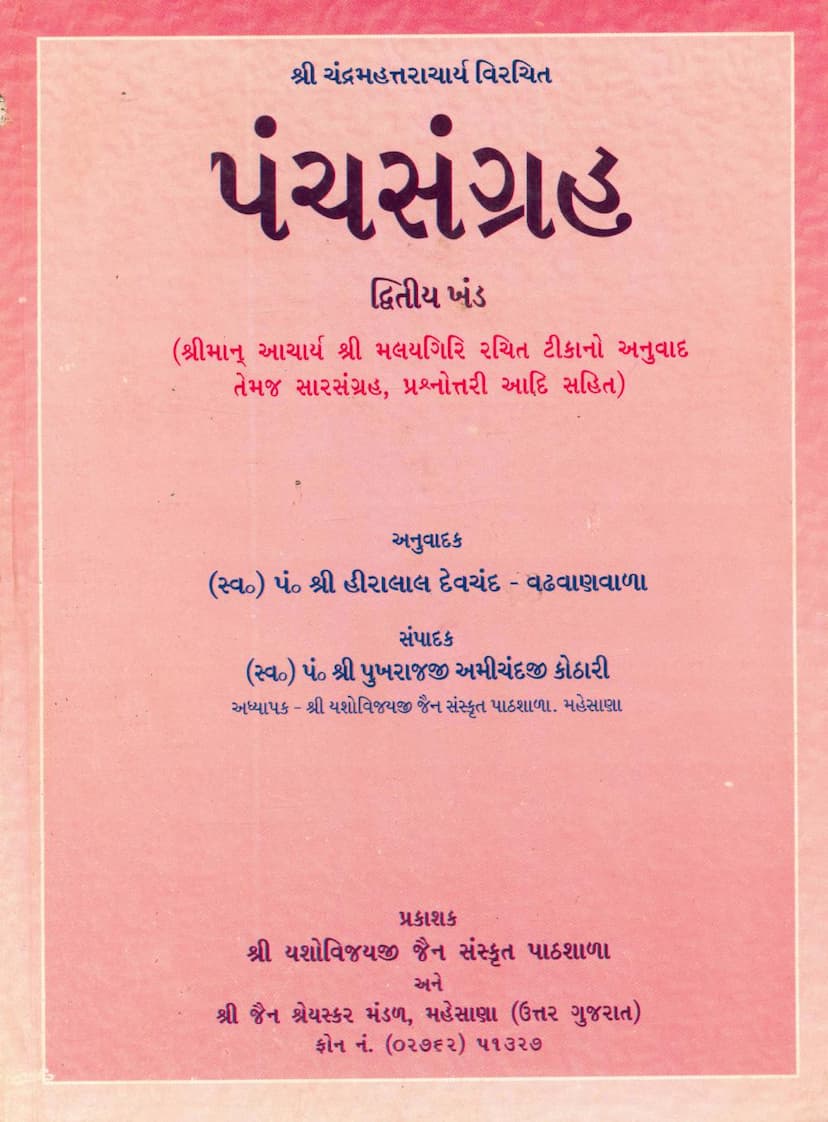Panchsangraha Part 02
Added to library: September 2, 2025

Summary
Based on the provided text, here is a comprehensive summary of the Jain text "Panchsangraha Part 02":
Book Title: Panchsangraha Part 02 Author(s): Hiralal Devchand, Pukhraj Amichand Kothari Publisher: Yashovijayji Jain Sanskrit Pathshala Mahesana Catalog Link: https://jainqq.org/explore/005675/1
Overall Scope and Content:
"Panchsangraha Part 02" (second volume) is a significant Jain text, originally authored by Acharya Chandrarshi Mahattaracharya and elaborated upon with commentary by Acharya Malayagiri. This particular edition is a Gujarati translation and compilation, meticulously prepared by Pandit Shri Hiralal Devchand and edited by Pandit Shri Pukhrajji Amichandji Kothari. Published by Shrimad Yashovijayji Jain Sanskrit Pathshala, Mehsana, this volume focuses on the profound and intricate subject of Karma (Karmavada) within Jain philosophy. It specifically delves into the "Karmaprakriti" section of the broader Pancasangraha text, offering a detailed analysis of the eight "Karanas" (mechanisms or processes) related to karma bondage and its subsequent transformations.
Key Themes and Concepts:
The text is a deep exploration of Jain Karma theory, with a particular emphasis on the practical application of these principles for spiritual liberation (moksha). The second volume of Pancasangraha is dedicated to explaining the eight "Karanas" which are the primary ways in which karma interacts with the soul and its subsequent modifications. These eight karanas, extensively detailed and explained with commentary and illustrative examples, are:
- Bandhan (Bondage): The process by which karmic particles (karmic matter) attach to the soul due to its activities and states of being (adhyavasaaya).
- Sankramana (Transmigration/Flow): The process by which karmic matter, once bound, undergoes changes in its nature, duration, intensity, and quantity. This section explains how karmic particles can change from one state to another.
- Uddvartana (Enhancement): The process by which the duration and intensity of bound karma increase.
- Apavartana (Diminution): The process by which the duration and intensity of bound karma decrease.
- Udirana (Eruption): The process by which karmic particles that have not yet reached their fruition period are made to erupt and yield their results prematurely.
- Upashamana (Suppression): The process by which the effects of karma are temporarily suppressed or held in abeyance.
- Niddhatti (Predetermination): The state where karmic matter is bound in such a way that its duration and intensity can be modified by certain karanas (like Uddvartana or Apavartana), but its specific nature (prakriti) remains unchanged.
- Nikachana (Irrevocable Sealing): The state where karmic matter is bound so irrevocably that its nature, duration, intensity, and quantity cannot be modified by any karana. It must yield its results as originally bound.
Structure and Content:
The book, as indicated by its introduction and table of contents (visayanukram), is structured meticulously. It starts with an introduction to Jain philosophy, emphasizing the centrality of Karma Vada. The text then proceeds to detail each of the eight karanas with extensive explanations, including:
- Definitions and Nature: Explaining what each karana is, its underlying principles, and how it functions.
- Types and Classifications: Elaborating on the different types or subtypes within each karana.
- Mechanisms and Processes: Detailing the precise ways in which these karanas operate on karmic particles.
- Examples and Analogies: The text frequently uses analogies, particularly from legal systems (like courts and judgments), to illustrate the complex concepts of karma modification, making them more accessible.
- Alpabahutva (Relative Quantity): Discussing the comparative quantities of karma or the souls involved in these processes, which is a crucial aspect of Jain logic.
- Svadhyaya Aids: The edition includes summaries (sarangrah), question-and-answer sections (prashnottari), and diagrams/charts (yantra) to aid the reader's study and contemplation.
Translators and Editors:
The translation by Pt. Hiralal Devchand and the editing by Pt. Pukhrajji Amichandji Kothari highlight the effort to make this profound spiritual text understandable in Gujarati. The publishers, Shrimad Yashovijayji Jain Sanskrit Pathshala and Shri Jain Shreyaskar Mandal, Mehsana, have undertaken the crucial task of making this valuable philosophical work available to the Jain community, acknowledging the demand from scholars and practitioners.
Philosophical Significance:
The "Panchsangraha" is recognized as a foundational text in Jain monastic education for understanding karma. The second volume's focus on the eight karanas provides a detailed framework for how karma operates and how an individual soul can influence its karmic states through conscious effort (adhyavasaaya) and spiritual practices, ultimately leading to liberation. The text emphasizes the subtle and meticulous analysis of karmic processes, reflecting the depth of Jain metaphysics.
Target Audience:
This book is primarily intended for serious students and practitioners of Jainism, particularly those engaged in the study of Jain philosophy and the detailed mechanics of karma, often referred to as "Dravyanuyoga." It is crucial for understanding the path to spiritual liberation prescribed by the Jinas.
In essence, "Panchsangraha Part 02" is a comprehensive and scholarly work that meticulously dissects the operational aspects of Jain karma, providing a detailed roadmap for understanding the soul's journey through the cycle of existence and its ultimate path to freedom.